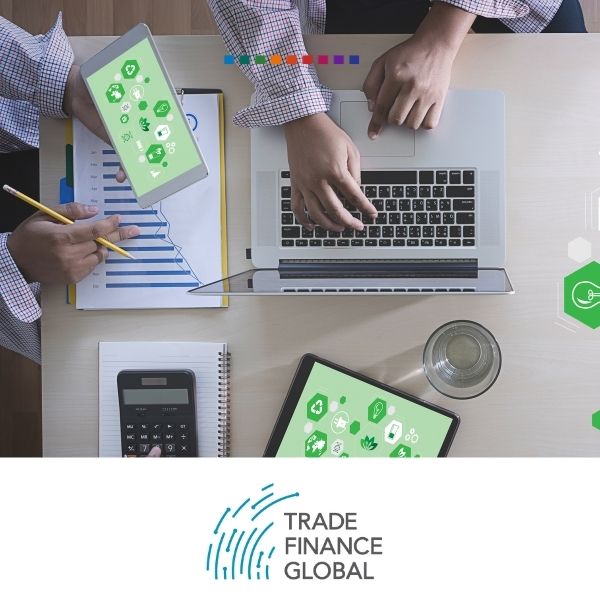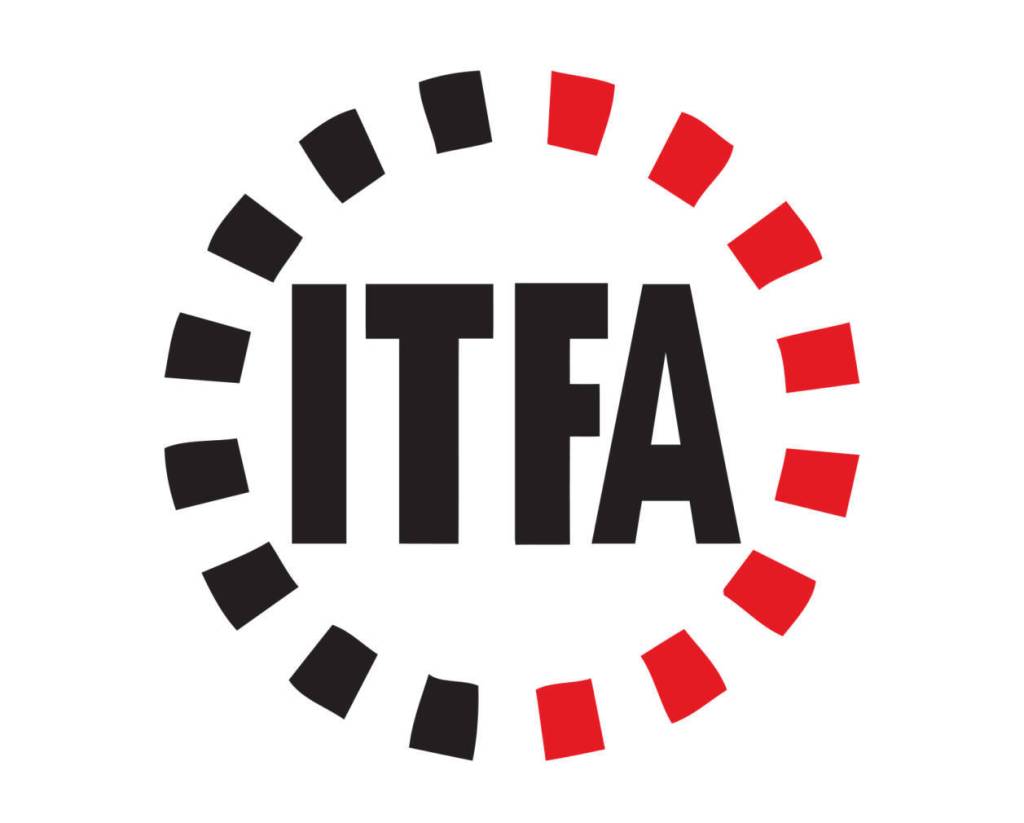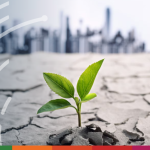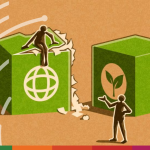- Topics
- Themes
-
Trade
Do you want to know how access to trade finance can increase your cross-border imports and exports? Explore our Trade Finance hub for practical tools.
Treasury
Are you a treasury or operations manager looking to mitigate the risks and efficiently manage your business’ cash flow? If so, check out our Treasury Management hub.
Payments
Whether you want updates from infrastructure support to cross-border transactions or clearing house operations to processing techniques, you can find all on our Payments hub.
Letters of Credit
Ready to to increase your imports / exports to guarantee the payment and delivery of goods? Find out more about LCs here.
Shipping & Logistics
Whether you’re transporting goods, or learning about supply chains, warehousing, transportation and packaging, we’ve got you covered.
Incoterms
Need to know which International Commerce Term is right for your needs? Explore our curated guides from shipping expert Bob Ronai.
Sustainability
Prioritising sustainable supply chains? Building inclusive trade? Working towards the UN’s 2030 SDGs? Read the latest on global sustainable standards vs green-washing here.
Customs
Heading into international markets? From the correct documentation to standardisation, here’s what you need to know for a streamlined customs clearance process.
TradeTech
TradeTech is rapidly evolving to help reduce some of the biggest challenges when it comes to trade. Keep up with these innovations here.
-
- News & Insights
-
News
The latest in Trade, Treasury & Payments - stay up to date on all the changes across the globe.
Magazines
The issues feature experts across the industry on the latest developments with specific themed and regional editions.
Articles
Insights by the industry, for the industry. These include thought leadership pieces, interview write ups and Q&As.
Guides
Working closely with industry experts and trade practitioners we provide inclusive educational guides to improve your technical knowledge and expertise in global trade.
Research & Data
We undertake qualitative and quantitative research across various verticals in trade, as well as create reports with industry association partners to provide in-depth analysis.
Trade Finance Talks
Subscribe to our market-leading updates on trade, treasury & payments. Join the TFG community of 160k+ monthly readers for unrivalled access in your inbox.
-
- Media
- Events
-
Partner Conferences
We partner with industry conferences around the world to ensure that you don’t miss out on any event; in person or online, add to your calendar now.
Women in Trade, Treasury & Payments
Get involved in our most important campaign of the year, celebrating the achievements of women in our industry and promoting gender equity and equality.
TFG Geneva
Trade Finance Global is excited to announce our first international conference: ‘TFG Geneva: Challenges and Opportunities within Trade & Commodities’, which will take place on 6 November 2025!
Awards
Our excellence awards in trade, treasury, and payments are like no other. You can't sponsor them, and they're independently judged. They are the most sought-after industry accolades.
Online Events
Join our virtual webinars and community events. Catch up on-demand, right here on TFG.
-
- Editions
- Themes
- Access Finance
- Finance Products
-
Trade Finance
Trade finance is a tool that can be used to unlock capital from a company’s existing stock, receivables, or purchase orders. Explore our hub for more.
Invoice Finance
A common form of business finance where funds are advanced against unpaid invoices prior to customer payment
Supply Chain Finance
Also known as SCF, this is a cash flow solution which helps businesses free up working capital trapped in global supply chains.
Bills of Lading
BoL, BL or B/L, is a legal document that provides multiple functions to make shipping more secure.
Letters of Credit
A payment instrument where the issuing bank guarantees payment to the seller on behalf of the buyer, provided the seller meets the specified terms and conditions.
Stock Finance
The release of working capital from stock, through lenders purchasing stock from a seller on behalf of the buyer.
Factoring
This allows a business to grow and unlock cash that is tied up in future income
Receivables Finance
A tool that businesses can use to free up working capital which is tied up in unpaid invoices.
Purchase Order Finance
This is commonly used for trading businesses that buy and sell; having suppliers and end buyers
-
- Sectors
-
Machinery & Equipment
Technology, construction, telecommunications, PPE, and electronics
Commodities & Materials
Raw materials, agricultural products, minerals, metals, and textiles
Chemical & Energy
Pharmaceuticals, chemicals, and energy products
Autos, Aerospace & Marine
Automotive, aviation, and marine industries
Pharma & Healthcare
Pharmaceuticals, healthcare equipment, and related sectors
Metals & Mining
Ores, minerals, metals, and concentrates
Finished Goods
Retail stock, e-commerce, textiles, clothing, and consumer goods
Construction & Projects
Construction, infrastructure, project finance, and green finance
Tech, Media & Telecom
Construction, infrastructure, project finance, and green finance
Food & Beverages
Food, drink, dairy, confectionery, and alcohol
Professional Services
E-commerce, recruitment, legal services, and hospitality
-
- Case Studies
-
Informing today's market
Financing tomorrow's trade
Soft Commodities Trader
Due to increased sales, a soft commodity trader required a receivables purchase facility for one of their large customers - purchased from Africa and sold to the US.
Metals Trader
Purchasing commodities from Africa, the US, and Europe and selling to Europe, a metals trader required a receivables finance facility for a book of their receivables/customers.
Energy Trading Group
An energy group, selling mainly into Europe, desired a receivables purchase facility to discount names, where they had increased sales and concentration.
Clothing company
Rather than waiting 90 days until payment was made, the company wanted to pay suppliers on the day that the title to goods transferred to them, meaning it could expand its range of suppliers and receive supplier discounts.
-
- Search
- Get Trade Finance
- Finance Products
- About Us
- Talk To Us
Sustainable Trade Finance


Access trade, receivables and supply chain finance
We assist companies to access trade and receivables finance through our relationships with 270+ banks, funds and alternative finance houses.
Get StartedOur Partner

Sustainable Trade Finance
Welcome to the TFG Sustainable Trade Finance Hub, a content centre for market insights on ESG, sustainability, climate change, and decarbonisation initiatives in relation to trade finance.
International trade is an engine for economic growth and development, but it also accounts for some 80% of the world’s carbon emissions.
This hub aims to report on how companies are tackling the challenge of meeting the targets of the 2016 Paris Agreement and the 2020 Glasgow Agreement, which set a path for signatory countries to reduce greenhouse emissions.
Additionally, the hub will offer information on how companies are aligning with the United Nations (UN) 2030 Sustainable Development Goals (SDGs), and how sustainability priorities are being integrated into global supply chains.
Finally, a transition towards sustainable and inclusive trade will require standards and definitions, the latest of which you can also find here.
Sustainable trade finance – Frequently asked questions (FAQs)
What is sustainable trade finance and what does it include?
In response to growing concerns over climate change and global warming, companies are increasingly looking at ways to minimise and mitigate their impact on the environment.
Companies are now identifying environmental, social, or governance (ESG) risks associated with their business activities, such as the use of fossil fuels or other polluting goods and services within their supply chains.
By better understanding those risks and their potential reputational, credit, and regulatory impacts, companies can play an active role in creating sustainable trade and encouraging sustainable practices, and can assist in the global implementation of sustainability policies and standards.
Green loan
As the name suggests, a green loan is a loan that is taken out to finance green projects.
The term ‘green loan’ was first introduced in March 2018, when the UK-based Loan Market Association (LMA) and several other industry bodies published a report known as ‘Green Loan Principles’.
In the report, as green loan is defined as follows: “The fundamental determinant of a green loan is the utilisation of the loan proceeds for Green Projects (including other related and supporting expenditures, including R&D), which should be appropriately described in the finance documents and, if applicable, marketing materials.
“All designated Green Projects should provide clear environmental benefits, which will be assessed, and where feasible, quantified, measured and reported by the borrower.”
As such, green projects could refer to those in sectors like renewable energy, waste reduction, and clean transportation, and can also cover related and supporting expenditures like research and development (R&D).
At present, one of the biggest challenges for the sustainable financing industry is its lack of common standards, and that’s why the LMA and its partner organisations published the ‘Green Loan Principles’, which attempts to set out market standards and guidelines.
Other industry bodies, such as the International Chamber of Commerce (ICC), are also currently in the process of introducing a draft framework of globally accepted standards and definitions for sustainable trade and trade finance, which would also cover green loans.
Within the trade finance industry, major banks are already issuing green loans, and their numbers continue to grow.
This year, for example, UKEF announced a £430 million green loan – first-ever government-backed green transition loan to engineering and consultancy firm Wood to seize new clean growth export opportunitiesfirst.
Sustainability-linked loan
In 2019, the LMA and several partner organisations published the ‘Sustainability Linked Loans Principles’, as a follow-up to the ‘Green Loan Principles’ mentioned above.
According to the 2019 report, sustainability-linked loans are defined as “loan instruments and/or contingent facilities (such as bonding lines, guarantee lines or letters of credit) which incentivise the borrower’s achievement of predetermined sustainability performance objectives”.
In contrast to green loans, a sustainability-linked loan can be issued for non-green purposes, such as the financing of general business operations.
Specifically, a sustainability-linked loan could link conditions such as the term or price of a loan to the borrower’s performance against particular sustainability targets.
As such, these targets are usually negotiated and agreed on by the borrower and the lender for each transaction.
And finally, it should also be noted that a loan can be structured using both green loan and sustainability-linked loan principles simultaneously.
Sustainable supply chain finance
Sustainable supply chain finance refers to financial practices and techniques that incentivise sustainable behaviours among parties to a transaction.
In practice, sustainable finance supply chain finance rewards suppliers for integrating ESG priorities into their supply chain.
Sustainable shipment letter of credit (SSLC)
A sustainable shipment letter of credit (SSLC) is a green financing product that was developed specifically for trade finance.
It was first launched in 2014 by the International Finance Corporation (IFC) – which is part of World Bank Group – and the Banking the Banking Environment Initiative (BEI).
The BEI is a group of global banks that aims to promote a more sustainable economic future.
It was convened in 2010 by the Cambridge Institute for Sustainability Leadership in the UK, with the shared goal of expanding the global trade of sustainably-sourced commodities.
Like a regular letter of credit, an SSLC allows for discounted financing for trade transactions, but unlike a regular letter of credit, it is only issued based on specific sustainability criteria.
To qualify for an SSLC, a supplier must provide evidence that their product meets internationally-recognised sustainability criteria, and that is usually done in the form of a sustainability stamp that is specific to the supplier’s industry.
For example, the first use of an SSLC was for a shipping of palm oil backed by a Roundtable on Sustainable Palm Oil (RSPO) certificate, which guarantees that no forests or communities were harmed during the extraction of the oil.
What is green finance and why is it important?
Green finance is a broad term that typically refers to financial investments that contribute to sustainable development and environmental initiatives. Learn more about green finance here.
Green finance is important as it promotes and supports the flow of financial instruments and related services towards the development and implementation of sustainable business models, trade, and investments.
More broadly, green finance facilitates the introduction of sustainable economic, environmental, and social policies. This includes the advancement of policies oriented towards the United Nations (UN) 2030 Sustainable Development Goals (SDGs), which seek to shift the focus of commercial activity from shareholders’ value creation (economic value) to stakeholders’ value creation (economic, environmental, and social value
What are green finance products?
Green finance encompasses all the initiatives taken by private and public agents (e.g. businesses, banks, governments, international organisations, etc.) to develop, promote, implement, and support projects with sustainable environmental impacts through financial instruments.
Examples of green finance projects could include the promotion of renewable energies, energy efficiency, water sanitation, and environmental audits.
Green finance could also be used to reduce transportation and industrial pollution; to tackle climate change and deforestation; or to lower a company’s own carbon footprint.
What is the difference between sustainable finance and green finance?
The terms ‘sustainability’ and ‘ESG’ are often used interchangeably, including by business leaders and environmental campaigners.
Sustainability and ESG are similar concepts, but in their current usage the main difference is that ESG often refers to specific metrics that can be quantified and measured, whereas sustainability does not.
Sustainability is more of an umbrella term that encompasses a company’s efforts to reduce the negative impacts of its business on the environment, such as by reducing or offsetting its carbon emissions.
What is sustainable trade finance and what does it include?
In response to growing concerns over climate change and global warming, companies are increasingly looking at ways to minimise and mitigate their impact on the environment.
Companies are now identifying environmental, social, or governance (ESG) risks associated with their business activities, such as the use of fossil fuels or other polluting goods and services within their supply chains.
By better understanding those risks and their potential reputational, credit, and regulatory impacts, companies can play an active role in creating sustainable trade and encouraging sustainable practices, and can assist in the global implementation of sustainability policies and standards.
Green loan
As the name suggests, a green loan is a loan that is taken out to finance green projects.
The term ‘green loan’ was first introduced in March 2018, when the UK-based Loan Market Association (LMA) and several other industry bodies published a report known as ‘Green Loan Principles’.
In the report, as green loan is defined as follows: “The fundamental determinant of a green loan is the utilisation of the loan proceeds for Green Projects (including other related and supporting expenditures, including R&D), which should be appropriately described in the finance documents and, if applicable, marketing materials.
“All designated Green Projects should provide clear environmental benefits, which will be assessed, and where feasible, quantified, measured and reported by the borrower.”
As such, green projects could refer to those in sectors like renewable energy, waste reduction, and clean transportation, and can also cover related and supporting expenditures like research and development (R&D).
At present, one of the biggest challenges for the sustainable financing industry is its lack of common standards, and that’s why the LMA and its partner organisations published the ‘Green Loan Principles’, which attempts to set out market standards and guidelines.
Other industry bodies, such as the International Chamber of Commerce (ICC), are also currently in the process of introducing a draft framework of globally accepted standards and definitions for sustainable trade and trade finance, which would also cover green loans.
Within the trade finance industry, major banks are already issuing green loans, and their numbers continue to grow.
This year, for example, UKEF announced a £430 million green loan – first-ever government-backed green transition loan to engineering and consultancy firm Wood to seize new clean growth export opportunitiesfirst.
Sustainability-linked loan
In 2019, the LMA and several partner organisations published the ‘Sustainability Linked Loans Principles’, as a follow-up to the ‘Green Loan Principles’ mentioned above.
According to the 2019 report, sustainability-linked loans are defined as “loan instruments and/or contingent facilities (such as bonding lines, guarantee lines or letters of credit) which incentivise the borrower’s achievement of predetermined sustainability performance objectives”.
In contrast to green loans, a sustainability-linked loan can be issued for non-green purposes, such as the financing of general business operations.
Specifically, a sustainability-linked loan could link conditions such as the term or price of a loan to the borrower’s performance against particular sustainability targets.
As such, these targets are usually negotiated and agreed on by the borrower and the lender for each transaction.
And finally, it should also be noted that a loan can be structured using both green loan and sustainability-linked loan principles simultaneously.
Sustainable supply chain finance
Sustainable supply chain finance refers to financial practices and techniques that incentivise sustainable behaviours among parties to a transaction.
In practice, sustainable finance supply chain finance rewards suppliers for integrating ESG priorities into their supply chain.
Sustainable shipment letter of credit (SSLC)
A sustainable shipment letter of credit (SSLC) is a green financing product that was developed specifically for trade finance.
It was first launched in 2014 by the International Finance Corporation (IFC) – which is part of World Bank Group – and the Banking the Banking Environment Initiative (BEI).
The BEI is a group of global banks that aims to promote a more sustainable economic future.
It was convened in 2010 by the Cambridge Institute for Sustainability Leadership in the UK, with the shared goal of expanding the global trade of sustainably-sourced commodities.
Like a regular letter of credit, an SSLC allows for discounted financing for trade transactions, but unlike a regular letter of credit, it is only issued based on specific sustainability criteria.
To qualify for an SSLC, a supplier must provide evidence that their product meets internationally-recognised sustainability criteria, and that is usually done in the form of a sustainability stamp that is specific to the supplier’s industry.
For example, the first use of an SSLC was for a shipping of palm oil backed by a Roundtable on Sustainable Palm Oil (RSPO) certificate, which guarantees that no forests or communities were harmed during the extraction of the oil.
Featured Insights






















